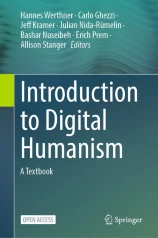In der letzten Zeit sind u.a. diese frei verfügbaren Titel erschienen:
Introduction to Digital Humanism
Hannes Werthner, Carlo Ghezzi, Jeff Kramer, Julian Nida-Rümelin, Bashar Nuseibeh, Erich Prem, Allison Stanger (Hrsg.)
https://doi.org/10.1007/978–3‑031–45304‑5
This open access textbook introduces and defines digital humanism from a diverse range of disciplines. Following the 2019 Vienna Manifesto, the book calls for a digital humanism that describes, analyzes, and, most importantly, influences the complex interplay of technology and humankind, for a better society and life, fully respecting universal human rights.
The book is organized in three parts: Part I “Background” provides the multidisciplinary background needed to understand digital humanism in its philosophical, cultural, technological, historical, social, and economic dimensions. The goal is to present the necessary knowledge upon which an effective interdisciplinary discourse on digital humanism can be founded.
Part II “Digital Humanism – a System’s View” focuses on an in-depth presentation and discussion of the main digital humanism concerns arising in current digital systems. The goal of this part is to make readers aware and sensitive to these issues, including e.g. thecontrol and autonomy of AI systems, privacy and security, and the role of governance.
Part III “Critical and Societal Issues of Digital Systems” delves into critical societal issues raised by advances of digital technologies. While the public debate in the past has often focused on them separately, especially when they became visible through sensational events the aim here is to shed light on the entire landscape and show their interconnected relationships. This includes issues such as AI and ethics, fairness and bias, privacy and surveillance, platform power and democracy.This textbook is intended for students, teachers, and policy makers interested in digital humanism. It is designed for stand-alone and for complementary courses in computer science, or curricula in science, engineering, humanities and social sciences. Each chapter includes questions for students and an annotated reading list to dive deeper into the associated chapter material. The book aims to provide readers with as wide an exposure as possible to digital advances and their consequences for humanity. It includes constructive ideas and approaches that seek to ensure that our collective digital future is determined through human agency.
Literaturwissenschaft und Informatik: Transdisziplinäre Perspektiven, digitale Methoden und selbstlernende Algorithmen
Alexa Lucke & Hermann Johannes (Hrsg.)
https://doi.org/10.1515/9783839470039
Die transdisziplinäre Zusammenarbeit stellt die Fächer Literaturwissenschaft und Informatik vor die Herausforderung, ihre Theoriebildungen und Modelle neu zu perspektivieren.
Die Beiträger*innen dokumentieren exemplarisch die spannungsreiche Verschränkung von digitalen und klassischen Methoden, fachlichen Standards sowie unterschiedlichen Forschungsgegenständen der beiden höchst differenten Wissenschaftskulturen. Aus der Sicht beider Disziplinen eruieren sie die epistemologischen Mehrwerte digitaler Modellierung oder evaluieren Tools für die Analyse literarischer Texte – und stoßen so durch die wechselseitigen methodologischen Perspektiven eine Revision facheigener Fragestellungen an.
Projektmanagement und Digital Humanities – Zur klugen Gestaltung der Zusammenarbeit
Fabian Cremer, Swantje Dogunke, Anna Maria Neubert, Thorsten
Wübbena (Hrsg,)
https://doi.org/10.14361/9783839469675
Die Rahmenbedingungen für Projekte in den Digital Humanities können herausfordernd sein: Zum einen ist die Innovationserwartung beteiligter Institutionen und Fördergeber ungebremst. Zum anderen bedürfen die Koordination interdisziplinärer, komplexer Großvorhaben sowie der Aufbau von Forschungsinfrastruktur und ‑services einer Professionalisierung des Projektmanagements.
Die Beiträger*innen geben Einblicke in unterschiedliche Praktiken und versammeln Sichtweisen aus der Fachcommunity. Damit gehen sie den ersten Schritt, um das Tätigkeitsfeld in den deutschsprachigen Fachdiskurs zu holen – und zeigen durch theoriegeleitete Reflexionen methodologische Ansätze zu einer Weiterentwicklung des Wissenschaftsmanagements auf.


